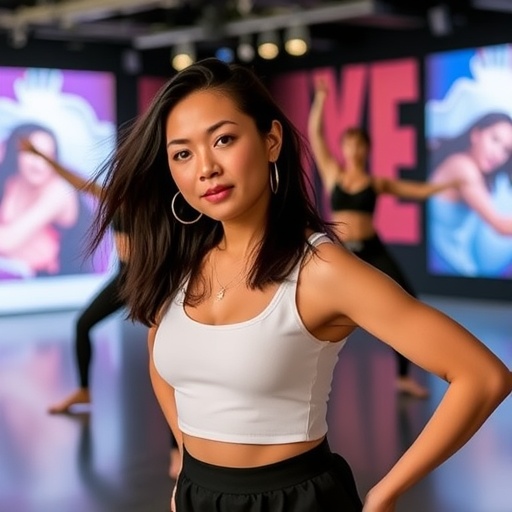In a groundbreaking move that’s set to electrify the world of dance education, celebrated choreographer Jennifer Archibald has joined the University of South Florida (USF) faculty to introduce a pioneering K-Pop dance program. This initiative promises to bridge the gap between high-energy commercial dance and the global phenomenon of K-Pop, equipping students with the skills to thrive in one of the fastest-growing entertainment sectors.
Jennifer Archibald’s Stellar Career Paves Way for USF’s K-Pop Breakthrough
Jennifer Archibald, a name synonymous with innovation in commercial dance, has long been a force in the performing arts. With over two decades of experience choreographing for major artists, television shows, and live events, Archibald’s portfolio reads like a who’s who of entertainment. She first gained widespread acclaim in the early 2000s for her work on MTV award shows, where her fusion of hip-hop, contemporary, and pop elements captivated audiences worldwide. “I’ve always believed that dance is the universal language of emotion,” Archibald said in a recent interview. “Bringing K-Pop to USF is about empowering the next generation to speak that language fluently in a global context.”
Archibald’s journey to K-Pop wasn’t accidental. Born in New York but raised in a multicultural household, she immersed herself in various dance forms from a young age. Her breakthrough came in 2015 when she collaborated with international pop acts, including a stint choreographing for a touring K-Pop group during their U.S. leg. This experience ignited her passion for the genre’s precise, synchronized movements and storytelling through dance. By 2020, she had founded her own studio in Los Angeles, specializing in commercial dance training that incorporates K-Pop techniques. Now, at 45, Archibald is channeling that expertise into academia at USF, a public research university in Tampa known for its vibrant arts programs.
USF’s decision to bring Archibald on board stems from a strategic push to modernize its dance curriculum. The School of Theatre and Dance, which boasts over 500 students annually, has traditionally focused on classical and contemporary forms. However, with the global K-Pop wave—evidenced by the genre’s $10 billion economic impact in 2023 according to the International Federation of the Phonographic Industry—administrators saw an opportunity to align education with industry demands. “Jennifer’s arrival is a game-changer,” noted Dr. Elena Vasquez, Dean of the College of The Arts at USF. “Her program will not only attract top talent but also position USF as a leader in commercial dance innovation.”
Archibald’s first semester at USF kicked off in fall 2024 with a pilot class titled “Dynamics of K-Pop Choreography,” limited to 25 students. The course blends technical training with creative exploration, drawing from iconic K-Pop routines by groups like BTS and BLACKPINK. Students have already reported transformative experiences. “It’s intense—hours of mirroring formations and perfecting isolations—but it’s exhilarating,” shared sophomore Mia Chen, a dance major from Orlando. Chen, whose family hails from Seoul, added, “Jennifer makes it feel accessible, like we’re part of something bigger than just steps.”
Fusing Commercial Dance Styles with K-Pop Precision at USF
At the heart of Archibald’s USF program is a deliberate fusion of commercial dance and K-Pop aesthetics. Commercial dance, often characterized by its adaptability to media like music videos and live performances, provides the foundation. Archibald teaches students to layer K-Pop‘s hallmark elements—sharp isolations, fluid waves, and group synchronization—onto this base. “K-Pop isn’t just dance; it’s a performance art that demands versatility,” Archibald explained during a campus demo. “We’re teaching students to improvise within rigid structures, much like how K-Pop idols adapt to fan demands.”
The curriculum is meticulously structured. Weekly sessions begin with warm-ups rooted in commercial dance fundamentals, such as floorwork and partnering, before diving into K-Pop-specific drills. Students analyze videos of performances, breaking down formations that involve up to 20 dancers moving in unison. One innovative module focuses on “conceptual choreography,” where learners create routines inspired by K-Pop themes like empowerment or nostalgia. This approach not only hones technical skills but also fosters creativity, essential for the K-Pop industry’s emphasis on visual storytelling.
To illustrate the blend, consider a recent class exercise: Students reimagined a classic commercial dance piece from Archibald’s MTV days with K-Pop flair. Using props like LED lights to mimic concert effects, participants executed a routine that combined popping and locking with K-Pop‘s signature pointing and gazing techniques. “It’s about energy transfer,” Archibald emphasized. “In commercial dance, you sell the move; in K-Pop, you sell the story.” Feedback from guest auditors, including scouts from agencies like YG Entertainment’s U.S. branch, has been overwhelmingly positive, highlighting the program’s real-world applicability.
USF’s facilities enhance this fusion. The state-of-the-art Marshall Student Center dance studios, equipped with mirrored walls and professional sound systems, allow for immersive practice. Archibald has also integrated technology, using apps for virtual reality simulations of K-Pop stages. This tech-savvy element appeals to Gen Z students, with enrollment in related dance courses up 30% since the program’s announcement. “We’re not just teaching steps; we’re building performers who can compete globally,” said Archibald, underscoring the program’s forward-thinking ethos.
USF Students Seize Opportunities in the Exploding K-Pop Industry
For USF dance students, Archibald’s program opens doors to the burgeoning K-Pop industry, projected to grow by 15% annually through 2030 per PwC’s Global Entertainment & Media Outlook. The genre’s global fanbase—over 100 million active listeners on Spotify alone—has created demand for skilled choreographers and backup dancers. Archibald’s classes prepare participants by simulating auditions, resume building, and networking with industry pros. “This isn’t theory; it’s a launchpad,” affirmed junior Alex Rivera, who credits the program for landing a freelance gig with a K-Pop cover group in Miami.
Student testimonials paint a vivid picture of impact. Take sophomore Lila Patel, an Indian-American dance enthusiast: “Before this, I saw K-Pop as entertainment. Now, under Jennifer’s guidance, I’m choreographing my own pieces and dreaming of Seoul auditions.” The program includes guest lectures from K-Pop veterans, such as former SM Entertainment choreographer Kim Ji-hoon, who shared insights on navigating cultural nuances in dance. Statistics from the U.S. Bureau of Labor Statistics show dance jobs growing 5% faster than average, but K-Pop‘s niche could accelerate that for specialized talents.
Beyond individual success, the program fosters community. USF’s K-Pop Dance Club, now mentored by Archibald, has swelled to 80 members, hosting flash mobs and workshops. One highlight was a October 2024 performance at USF’s homecoming, where students debuted a routine blending commercial dance with K-Pop hits like NewJeans’ “Ditto.” The event drew 2,000 spectators and went viral on TikTok, amassing 500,000 views and attracting interest from talent agencies. “These kids are ready,” Archibald beamed. “They’re not just dancing; they’re building careers.”
Challenges persist, however. Visa hurdles for international opportunities and the industry’s competitive nature are topics Archibald addresses head-on. She organizes mock interviews and portfolio reviews, ensuring students are resilient. For underrepresented groups, the program emphasizes inclusivity, with scholarships for diverse applicants. Early outcomes are promising: Three inaugural students have secured internships with L.A.-based K-Pop production companies, signaling USF’s rising profile in commercial dance.
The Global K-Pop Surge Reshapes Dance Education Landscapes
The infusion of K-Pop into USF’s curriculum reflects a broader transformation in dance education. Globally, K-Pop has transcended music, influencing fashion, film, and now academia. In South Korea, institutions like the Korea National University of Arts offer dedicated K-Pop performance degrees, training over 1,000 students yearly. U.S. programs, however, have lagged—until pioneers like Archibald stepped in. At USF, this shift aligns with a 25% increase in international dance enrollments since 2022, driven by K-Pop‘s cultural export.
Experts weigh in on the trend. Dance scholar Dr. Marcus Hale from New York University notes, “K-Pop‘s discipline mirrors ballet’s rigor but adds pop’s accessibility, making it ideal for modern curricula.” Hale points to economic drivers: The K-Pop market generated $9.5 billion in exports for South Korea in 2023, per the Korea Creative Content Agency, fueling job creation. In the U.S., platforms like YouTube and Netflix amplify this, with K-Pop videos garnering billions of views. Archibald’s USF role positions American students to capture a slice of this pie, potentially reducing the talent drain to Asia.
Comparative programs elsewhere offer context. Millsaps College in Mississippi introduced a K-Pop elective in 2023, seeing 40% enrollment growth, while UCLA’s commercial dance track now includes K-Pop modules. Yet USF’s partnership with Archibald stands out for its depth. The choreographer has secured grants from the National Endowment for the Arts, funding expanded classes and a spring 2025 showcase. “We’re creating a pipeline,” said USF Provost Ralph Wilcox. “From classroom to concert stage, these students will lead K-Pop‘s next chapter.”
Culturally, K-Pop challenges Western dance norms by prioritizing collectivism over individualism. Archibald’s teaching adapts this, encouraging ensemble work that builds teamwork. Health aspects are covered too—lessons on injury prevention amid K-Pop‘s demanding schedules. As one student put it, “Jennifer shows us the glamour and the grind.” This holistic approach ensures graduates are well-rounded, ready for the industry’s evolution.
Looking ahead, Archibald envisions collaborations with K-Pop labels for exchange programs, potentially sending USF dancers to Seoul for residencies. USF plans to scale the program, adding advanced tracks by 2026. With K-Pop‘s influence projected to permeate Hollywood—witness the success of films like “Squid Game”—opportunities abound. Students like Chen and Rivera are already eyeing tours with global acts. Archibald’s USF tenure isn’t just a class; it’s a catalyst for dance diplomacy, blending cultures through movement and propelling commercial dance into a vibrant future.
As the program gains momentum, its ripple effects could redefine dance education nationwide. With Archibald at the helm, USF is poised to produce choreographers who don’t just follow K-Pop trends—they set them, fostering a new era of cross-cultural creativity and career breakthroughs in the performing arts.








